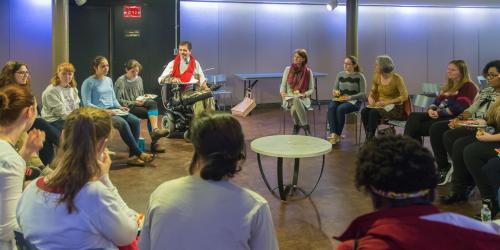As Disability Awareness Month comes to a close, Daily Shot writers caught up with Jim Wice, director of disability services, to discuss the significance of this series of demonstrations, workshops, and discussions that centered on the ways in which his office ensures that people with disabilities can study, work, and live fully engaged in campus life. Wice, who acquired a disability himself after a spinal cord injury in a swimming accident in college, said the Office of Disability Services provided accommodations and services to 304 students plus 23 staff and faculty last year.
Q: What is the value of Disability Awareness Month?
Jim Wice: Having a Disability Awareness Month fits into the culture of Wellesley College in that we often look at opportunities to celebrate and increase awareness during designated periods like this while also continuing that education throughout the year. Disability Awareness Month provides opportunities for the community to take time to recognize the vast diversity that disability encompasses, including both visible and invisible disabilities.
On campus as well as in the world, there are far more individuals with nonvisible disabilities, such as mental health needs, learning disabilities, ADHD, chronic health issues, and many more. Although not everyone among those with disabilities is in favor of such celebrations and education campaigns (some would say this needs to be ongoing, which hopefully we do), but at the moment it fits with our community.
Q: In your 18 years at Wellesley, can you cite some examples of progress in disability services? What does Wellesley do differently from other campuses?
Wice: From my start here, I appreciated the model practiced by the office, which was to serve the whole community—students, faculty, staff, and guests—so that everyone can experience our campus and enjoy access. Disability services at other campuses might only work with students and have difficulty figuring out how to serve others.
In my time here, we’ve worked with the administration to have power doors and ramps installed and modified parking accommodations. In our dining halls, we’ve become more accommodating to people with food allergies and gluten sensitivity through increased labeling, diet-specific menu choices, and food stations. Bates dining hall has a gluten-sensitive room that is something I would not have envisioned 18 years ago.
We also have some administrative behind-the-scenes operations that help us respond to accommodation requests we receive during the year. For example, the College created a supplemental budget for accommodations that could otherwise affect our standard budget if we suddenly had to cover associated costs for an item that was not included in our spending plan but was requested by a student.
Q: Are there accessibility challenges posed by Wellesley’s architecture and its hilly landscape?
Wice: Some of the physical challenges with respect to accessibility include the campus terrain, the sometimes inaccessible features of our buildings that were built before access codes, and the changing priorities based on newly entering students, staff, or faculty with physical needs or those who acquire them.
The College has done a lot of work. We have identified accessible routes through the landscape; provide the Access Van, which is scheduled by Disability Services, and the Rides List, which is dispatched by Campus Police; and we’ve made accessible/disability parking available.
A team effort by the Facilities Department, the campus ADA/504 Committee (which oversees compliance with the Americans with Disabilities Act and Section 504 of the Rehabilitation Act of 1973), and an architectural access consultant firm identifies ways to addresses access barriers in campus buildings. Some of the improvements have included bathroom modifications at Pomeroy Hall during its renovations. At Alumnae Hall, accessibility was accomplished with installation of an elevator. Slater International Center and Harambee House were made wheelchair accessible with trust funds designated for accessibility.
Q: How does your disability inform your work?
Wice: For a while, I felt like an observer in a strange new world, and as time passed I found I was no different than many others who acquire a disability. There are others who are born with a disability and have grown up with a different perspective. For me, I have had experiences in both worlds, and now hopefully we are all moving toward thinking about one world that includes people with disabilities in its planning and creation.




